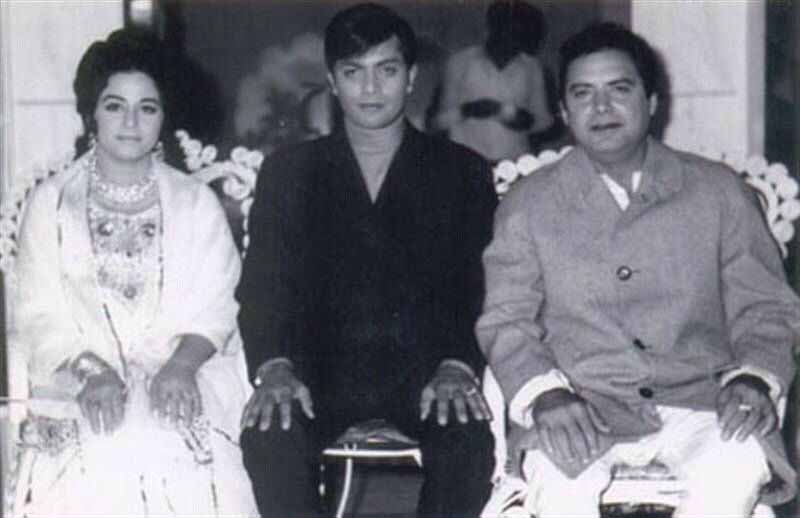Written by: Syed Abbas Hussain
Posted on: June 16, 2020 |  | 中文
| 中文
At the first Pakistan Film Festival organised by the then Pakistani Ambassador to the UN, Maleeha Lodhi, Sabiha Khanum was honored with a life time achievement award, presented to her by the then UN Deputy SG Jan Elliasson on the extreme left.
The word Khanum is literally translated as a woman of rank or position – an apt surname of an actress who ruled Pakistan’s cinema of the 1950’ and 60s. Known for her innocent beauty and acting prowess, Sabiha Khanum is often touted as the first lady of Lollywood. The Golden Girl of the Golden Era of Pakistani films continued to command reverence in the film circuit, much after her retirement.
A star of humble beginnings, she was born into a conservative family in the rural terrain of Gujrat, Punjab in 1935 as Mukhtar Begum. Incidentally, her showbiz journey began through singing. She lent her vocals in a program for Radio Pakistan where her father Muhammad Ali happened to be an employee. He subsequently connected her with stage drama writer and poet Nafees Khaleeli, who christened her with the screen name Sabiha Khanum.
She made her debut in the year 1950 with director Masood Pervaiz’s Baili, which was based on the events that unfolded during the partition of the Subcontinent in 1947. The film also launched Santosh Kumar as a hero. While the film garnered a lukewarm response at the box office, it was the first among many collaborations of Sabiha and Santosh, who spelled magic on celluloid for years to come. Sabiha tasted success in her next release, Do Aansoo (Two Tears), which was released the same year, helmed by director Anwar Kamal Pasha.
Do Ansoo had a successful 25 week run at the box office, and was given the status of a ‘silver jubilee’ hit. A star was born! She went on to prove her mettle with the blockbuster film Sassi, based on the folklore of Sassi Pannu, which managed to lure audiences to the cinema for straight 50 weeks. Films such as Waada, SaatLakha, Mauseeqar, Choti Begum, Naaji, Hasrat, and Daman enabled her to reign supreme as the numero uno actress of her time. Her commitment to her craft was such, that she worked amid the most unenviable of conditions with utmost dedication. Khanum shared in an interview that on many occasions she was so exhausted with long hours of shooting, that she used ice to nurse her sore eyes. On one occasion, she continued to shoot in the desert despite an attack of appendicitis, much to the chagrin of her doctor.

Sabiha Khanum (Left) with upcoming actor Waheed Murad (Center) and Santosh Kumar (Right)
She was the recipient of many popular awards, such as the Nigar Award, which was the most prestigious film award back in the day. She was also given the Pride of Performance award by the Government of Pakistan in 1986. Many of the songs picturized on her are still listened to fondly, such as Gayegi Duniya Geet Mere, Lat Uljhee Suljha Ja Re Balam, and Dilaa, Thehar Ja. Madam Noor Jehan was often the playback singer of her evergreen film songs.
The duo of Santosh and Sabiha not only presided over a successful professional relationship but also entered the bonds of matrimony after a protracted courtship. This couple dominated Lollywood as the most popular and sought-after duo of the Pakistani film industry in the 1950’s and early ‘60s. They became the icons of male and female beauty: Santosh, heavy-set, light skin, tall and handsome, while Sabiha had a beautiful face and full figure. They ruled the roost till Muhammad Ali and Zeba came along in the second half of the 1960s.
In an interview for the program Voice of America, Sabiha confessed, “…given that Santosh was previously married, my father was initially opposed to the marriage. However, he eventually conceded, and we finally tied the knot and lived happily ever after.”
After her husband’s demise in 1982, she avoided the limelight for some time. She later moved to television where she also established her foothold with some memorable performances. The talented thespian also worked in theatre plays, which toured nationally and internationally – a stint that was facilitated by the legendary comedian and anchor, Moin Akhtar. Sabiha was a lady of many talents and made her mark in whatever field of performing arts that she was associated with. She was the voice behind the hugely popular track, Jug Jug Jiye Mera Pyara Watan , that aired on Pakistan Television as part of Anwar Maqsood’s program, ‘Silver Jubilee’.
Sabiha Khanum bid a final farewell to her illustrious career and moved to Leesburg, Virginia a little more than a decade ago, where she spent the remaining years of her life with her daughter. She succumbed to kidney failure on June 13, 2020, at the age of 84. She has left behind an incredible legacy as a talented leading lady who shaped the Pakistani film industry in its early days, which became synonymous with this amazingly popular duo.
You may also like: